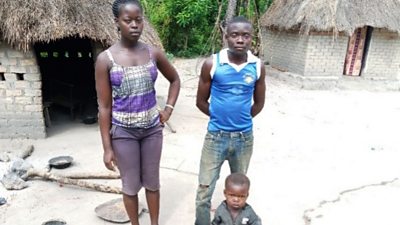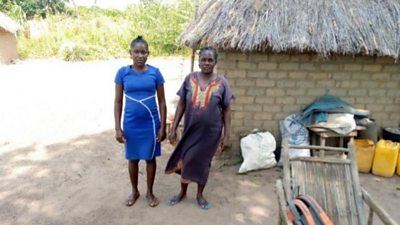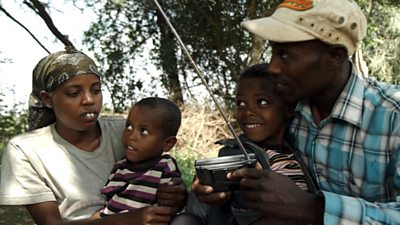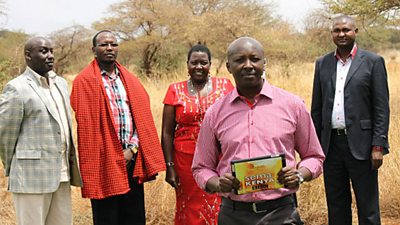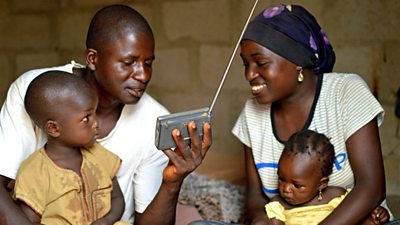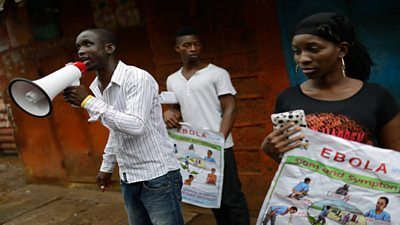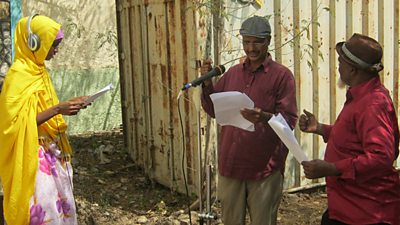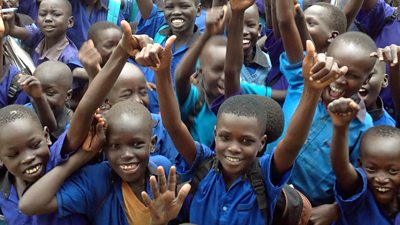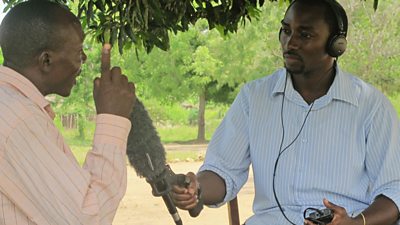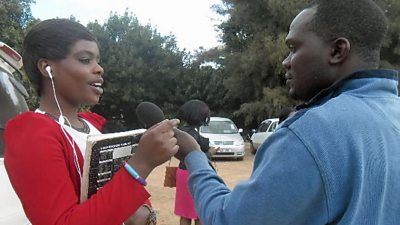- 'Our School' is a series of 15-minute factual radio programmes that include real-life stories of girls, families and schools to highlight the benefits of girls staying in school.
- 'Our School' producers are based in seven out of South Sudan’s 10 states, and they each produce locally-tailored episodes in the appropriate local language, including local voices.
- ����ý Media Action also works with local broadcast partners to produce discussion programmes that provide audiences with an opportunity to ask questions.
����ý Media Action’s radio programmes are part of (GESS), a major initiative designed to increase the number of girls enrolling in school and completing their education, as well as improving learning outcomes at both primary and secondary levels of education.
Tackling barriers to education
Few girls in South Sudan finish their full eight years of school. Poverty, insecurity, poor quality education and cultural traditions that discriminate against girls conspire to keep them from completing their schooling. Whilst financial support for girls and professional support for teachers is provided elsewhere in the GESS programme, 'Our School' addresses the negative cultural attitudes towards girls’ education.
Each 'Our School' programme highlights a practice or attitude that hinders girls’ education. This includes, for example, leaving girls to walk to school on their own – and face harassment - or loading them up with too much housework when they come home. Through interviews with girls, their families and teachers, 'Our School' showed how these factors can affect a girl’s education. At the same time, through positive role models, the programme showed girls how they can succeed.
Reaching out
As part of the project, we also take 'Our School' into “media-dark” areas – where there is no radio network – for people to listen to the show on wind up, solar-powered media players.
175 listening groups have been set up across the country since March 2014, many listening to the programme on a weekly basis. In one group in Eastern Equatoria, parents listened to the “journey to school” episode, and decided their children would walk to school together in a group – an idea sparked by the radio programme.
Making it relevant
Since the conflict in December 2013, which has left 1.3 million people displaced, 'Our School' adapted its programmes to meet the demands of those forced out of school in their home states.
Episodes featured stories of children who fled conflict and were now being welcomed at schools in other states, despite being without report cards or certificates. The programmes also showed how children from different states were learning from each other.
'Our School' also produced an episode from one of the IDP (Internally Displaced People) camps in Juba, the country’s capital, which encouraged children to remain interested in education and also encouraged parents to remember the value of education.
Making an impact
Endline research conducted for the first phase of the project in 2018 showed that 'Our School' reached nearly a third (31%) of the adult population - an estimated 1.8 million people - to prompt discussion about education. Regular listeners with children were significantly more likely to talk with their daughters about their education, and their understanding of the benefits of girls' education increased over the project period. For more insights, read the research summary here.
In 2019, the project entered its second phase, building on the knowledge, evidence and successes from the last seven years to continue supporting girls' education.
The COVID-19 pandemic has resulted in an estimated 4.8 million children in South Sudan being out of school. The pandemic initially delayed the production of the new series, repeats of previous episodes were aired across the country to encourage parents to continue to support their children's education at home, a finding backed by our midline research conducted for the project's second phase in 2021.
'Our School' reach increased from 31% in 2018 to 43% of the adult population in 2021. This included 3,643 family listening groups and 16,185 women, including 299 living with disability.
Our research found regular listeners of ‘Our School’ are more likely than non-listeners to say their children have been studying at home during school closures - whether they have sons, daughters or children with disabilities.
Some 34% of regular listeners of 'Our School' said their girls have been studying at home during school closures, compared with 18% of non-listeners.
'Our School' has particularly encouraged families to support children with disability to study. Some 45% of regular listeners said their child with disability has studied at home during school closures, compared with 22% of non-listeners.
Building on success
In December 2020, our research team visited a number of communities across South Sudan to understand current knowledge, attitudes and behaviours around disability inclusion, and sexual and reproductive health rights. These topics will inform new episodes for series two of 'Our School', launching later in 2021.
We are also working with 31 local media organisations to develop their capacity and knowledge on gender and disability awareness, for more inclusive programme-making.
Our audiences have improved knowledge, and changed attitudes and behaviour, about the importance of education after listening to 'Our School'. Read on to learn more about these stories of change.
Stories of change
Project information
| Project name | Girls’ Education South Sudan (GESS) |
| Funder | (previously Department for International Development) and |
| Dates |
Phase 1: 2012-2018 Phase 2: 2019-ongoing |
| Themes | Education |
| Outputs |
'Our School' weekly radio show, listener groups |
| Broadcast partners |
Jonglei FM, Radio Good News, Radio Emmanuel, Radio Nehemia, Radio Bakhita (CRN) Radio Eastern (CRN) Voice of Kajo Keji, Yambio FM, Radio Anisa, Voice of Hope, Weer Bei Radio, Kuajok FM and Don Bosco. |
| Partners |
Consortium led by Mott McDonald and including Leonard Cheshire, Montrose and Windle Trust International. |
Our projects in South Sudan
-
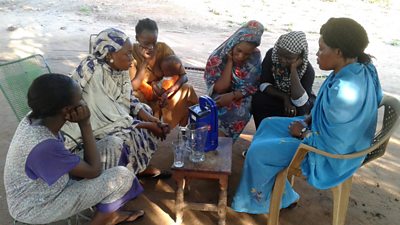
Life in Lulu: A beloved radio drama turns 10
Our radio drama Life in Lulu has covered a myriad of storylines in the last 10 years - from health and saving the lives of mothers and babies, to reducing conflict and promoting peaceful co-existence. -
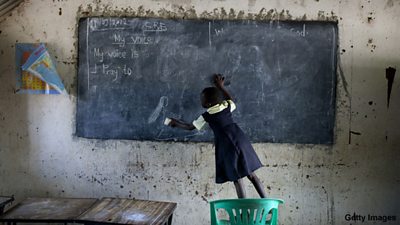
Our School: inspiring brighter futures for girls in South Sudan
A radio and outreach project aims to raise awareness of the importance of education for girls in South Sudan. -
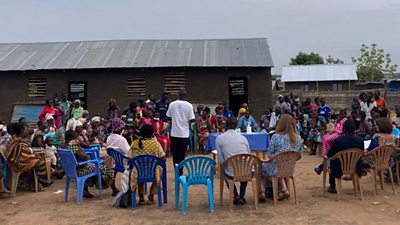
“Let’s Talk About Us” - tackling taboos about reproductive health
Our radio programme is sparking conversations about sexually transmitted infections, child marriage, early pregnancy, gender-based violence, puberty, menstrual hygiene and contraception. -
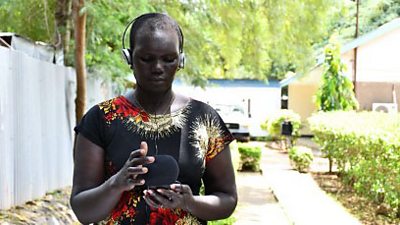
Building futures in South Sudan
Youth-focused radio programme Building Futures challenged negative perceptions of technical vocational education and training, and provided young people advice about job searching and starting their own businesses.
